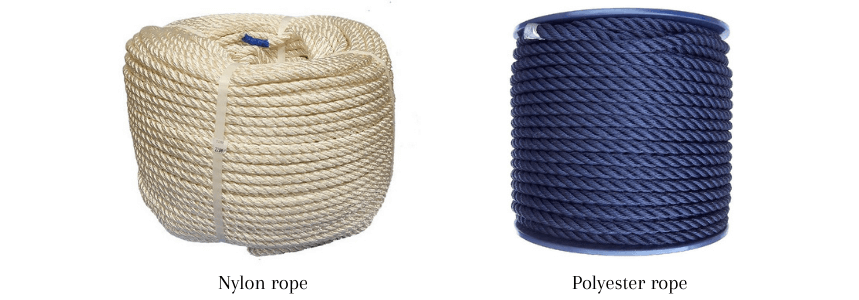This is a question we get asked all the time, here at RopesDirect.
What is the difference between nylon and polyester rope?
On the surface, they appear to be identical, and they do share many similar features. For example, they’re both constructed from industrial-grade synthetic materials, making them a stronger alternative to natural fibre ropes, and they’re both resistant to UV rays, abrasion and rot.
But there are some key differences between the two, which make them either more suitable or less suitable for certain jobs.
3 differences between nylon and polyester
- Flexibility
Nylon has a high level of flexibility. When necessary, it’s possible to stretch nylon rope by up to 20% without affecting its strength – and it will simply return to its original size afterwards. This makes it particularly good when you need the rope to be more shock absorbent, such as towing or mooring.
By contrast, polyester only stretches by about 10% under pressure, so it’s particularly suitable for low-stress uses such as flagpoles, tie-downs etc.
- Absorbency
Both nylon and polyester sink in water, however, they differ greatly in terms of their absorbency.
Although nylon rope is normally very strong it absorbs liquid quickly and easily, and this compromises its strength significantly. The fibres become waterlogged and start to sag. They also take a long time to dry. Therefore, nylon isn’t the best option for wet conditions.
Polyester ropes, on the other hand, do not absorb water. They retain their normal level of strength when they’re wet and, as a result, they are a better choice for marine applications.
- Temperature resistance
Another important difference between nylon and polyester is their resistance to heat. Nylon rope cannot withstand heat so well and will begin to degrade at 210°C. Polyester, however, has a high melting point of 260°C, so is typically a better choice in extreme temperatures.

Which is the right option for me – nylon or polyester?
Nylon rope is likely to be the ideal option when you need a rope to stretch a little and return to its original length, or be more shock absorbent, but for most other applications we tend to recommend polyester rope. It’s just as strong and durable as nylon, but has a number of additional benefits, such as low water absorbency and high temperature-resistance). In fact, many people believe that if polyester had been invented first, there would have been no need to invent nylon. It’s often cheaper to buy, has similar performance to nylon and is a good all-rounder: perfect for a wide range of uses.
Here at Ropes Direct, we stock both nylon and polyester – and, as experts in our field, we know the unique properties and benefits of each. So if you’d like to know more about the differences between the two – or need tailored advice on the best option for your needs – you’re welcome to get in touch at any time. We’re always pleased to help and will gladly point you in the right direction.
Give us a call on 01692 671721 to speak to a member of the team. Or send an email to info@ropesdirect.co.uk and we’ll respond to your enquiry as soon as possible.

